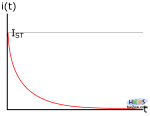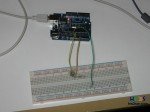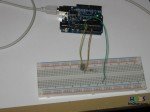 What happens when our bottle is full and source excluded?
What happens when our bottle is full and source excluded?
Imagine circuit in first page now without V, substituted by a line directed from R to Ground (the strange symbol that seems a bottom-up tower).
Remember C's voltage value?
That's V, with a starting I0.
So now R sees V at its right and zero-reference (Ground: G) on left: C pulls charges to G through R until its voltage differs from reference value.
See current behavior on above pictures.
Time requested? Sure! always to reach
of its maximum, and
to get zero.
Quick quiz: What if we cancel V source without adding a line, leaving circuit open? Will C discharge anyway?
Yes.
Joule (energy: J) effect is present; C slowly looses its accumulated energy ( gives J, i.e. Coulomb
Volt = Energy).
Joule effect concerns power dissipation by electrical component when submitted to a flowing current; this means that the first includes the last and vice-versa.
This happens in previous case too, because heat exchange is a must in nature.
Here below two pictures of circuit without power supply (second situation)
Difference between them is red LED on in first and off in second; talking about software everything will be clear.

